Episode 2! 一番搾り (Ichiban Shibori) helped me cement my understanding of a translator’s role and what “fluency” means. And I was able to get this podcast up and running again thanks to a little 自己分析 (jikobunseki, self analysis).
Author Archives: Daniel
How to Japanese Podcast – S02E01 – Mel Ok – JET Program, Translation, Japanese Whisky
Mel Ok is a translator and project manager based in Tottori Prefecture. We talked about Japanese study, the JET Program, translation, and Japanese whisky:
- Japanese in high school
- When did your Japanese skills start to “click”?
- Japanese in college
- University of Washington – Technical Japanese Program
- Working with long sentences – identifying subjects and verbs
- USJETAA Reading Group
- Jay Rubin’s “Making Sense of Japanese“
- “Mirroring“
- Teaching English in Japan
- JET Program
- JET CIR placements – rural vs. urban
- Tottori Prefecture’s internationalization efforts
- Interpreting on JET – consecutive vs. simultaneous
- JET Program Translation & Interpretation Course
- Connecting with local organizations for interpretations/translation opportunities
- JET Program application advice
- Watching TV = studying
- Project Management
- Shifting from JET to project management
- QA work
- Unemployment in Japan – ハローワーク (Hello Work)
- Types of translation projects
- Experience writing
- Sales
- Freelance Translation
- Translation Memory
- Japanese Association of Translators (JAT)
- Felix CAT
- Accordance searches
- Sales work vs. translation work
- Incorporating as a translator/company
- Hiring an accountant
- Translation Trials
- Work-life balance
- The Oatmeal – Why working from home is both awesome and horrible
- Spirits/Japanese Spirits
- Yamazaki 25
- Balvenie 12 DoubleWood
- Nomunication
- The Complete Guide to Japanese Drinks, Stephen Lyman
- Japanese Whisky, Brian Ashcraft
- Stephen Lyman and Christopher Pellegrini Instagram events
- Fuji-Sanroku
- Aged Shochu
- Investing in Whisky
- Yamazaki Owner’s Cask
- Whisky secondary market
- Mighty No. 9
- Karaoke Songs
- “Sakura,” Ketsumeishi
- Orange Range (The band Mel couldn’t remember.)
How to Japanese Podcast – S02E00 – Season 2 Trailer
お待たせしました! It took me longer than I hoped, but the How to Japanese Podcast is back. I’m interviewing another 10 people who have studied Japanese and done work in Japan. The interviews have run long, so I’ll be separating the interviews from my content and posting 20 episodes over the next few months. Subscribe wherever you get your podcasts.
And if you haven’t listened to Season 1, go ahead and give those episodes a listen.
Japanese Stonks

I’m in The Japan Times with a look at the language of investing: “Put your yen to work with the language of investing.”
Initially I was hoping to find out the Japanese equivalent of “stonks,” but it became clear that while there has been a boom in retail investors, not all of them are tuned in to the GameStop madness. Bloomberg has one report in Japanese (a really good read!) which says lack of English skills limited Japanese participation in the mania, but they just put out a new one in English about a bar for stock pickers that suggests maybe there has been some effect from GME.
They point out Satoshi Uehara, and I found another Twitter account X1_droid who is also investing in popular U.S. stocks. I found the term ジャンピングキャッチ (“jumping catch”) initially from their account. I also found an account/bot that translates Elon Musk tweets, and there seems to be a contingency of Japanese followers shadowing some of his moves. However, as the Musk-followers might suggest, these are all fanatics, not the Japanese public more broadly.
In terms of explaining what’s going on, there’s a blogger over at Note who’s been providing some solid Japanese language explanation of “stonks” and GameStop. There may be some other useful posts if there are any slang terms you’ve been trying to communicate to Japanese friends and family.
Intermediate Reading Recommendations
Reading Japanese is hard…until it isn’t. Finding the right material for that period of time when you’re moving from advanced beginner to intermediate is critical. You need to find something that’s not going to make you want to defenestrate the text itself or the device you’re reading it on but that will at the same time push you to learn new words and phrases.
Looking back on my own experience, I read the Murakami collection “Dead Heat on a Merry-go-round” while I was on a spring break trip. I think that was the first real book I read on my own, and it was just about the appropriate level. I could basically understand what was going on, and being on a trip meant I often just read past things I didn’t understand fully, trying to get a sense of the meaning from context. This is an important skill to practice, something you’re likely doing in your native language without realizing it.
I jumped into a couple of novels after that with the help of a professor, and I’m glad I had that help because there’s something about the first few pages of Japanese 純文学 (junbungaku, “pure literature”) that’s fairly dense and difficult. The text often settles down after this.
There are places to find the texts you need, online and for free. Here are a few reliable resources:
NHK’s Easy Japanese News

The news! But easy! For example, instead of 少数民族 (shōsū minzoku, minorities), the headline for this article uses 人口が少ない民族 (jinkō ga sukunai minzoku,people with a small population). There’s also a feature to turn furigana off and on. The bonus is that you’ll be keeping up with the latest news from Japan.
Ogawa Mimei
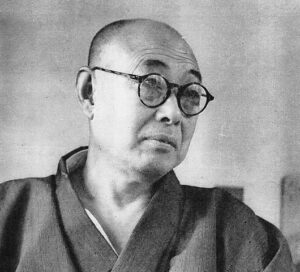
Someone is determined to upload all of Ogawa Mimei’s writing to Aozora. His stories just keep on popping up on the list of newly added works. They all have furigana and are written in a fairy tale/children’s literature style, so the grammar and vocabulary is relatively simple. We’ve been reading one for the Japanese Reading Group that’s been a lot of fun. Highly recommended.
Itoi Shigesato’s 今日のダーリン
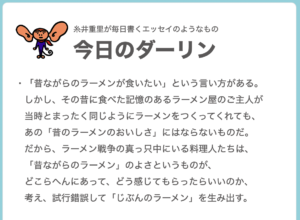
You might recognize Itoi Shigesato as the mind behind Mother (EarthBound). He was also the editor who got Murakami to write the series of super short stories that were collected in 夜のくもざる (Yoru no kumozaru, The Night of the Spider Monkey). He maintains a website ほぼ日刊イトイ新聞 (Hobo nikkan Itoi shimbun, Nearly Daily Itoi Times), which has a short essay on the front which self-destructs each day and is not archived (although it does look like he makes the previous day’s essay available now?). They’re relatively short and pretty casual. The title of the series is 今日のダーリン (Kyō no dārin, Today’s Darling). Worth a read!
Ameblo
Ameblo is Japan’s largest blog network. Recommendations on the top page usually point to active and often illustrated blogs, but you can also search by topic and interest. The best part about these blogs is that you’ll be getting casual, living Japanese, which won’t always be easy to understand but will be useful. Explore! And while you’re at it, why not try creating your own blog?
The real key for any of these is ensuring that you get the repetitions. Having the right reading material matters very little if you’re not actively getting through it. Do whatever it takes (be ruthless) to get those repetitions.
How to 告白
I’m in The Japan Times with a look at how to 告白 (kokuhaku, confess): “Confess! Dating in Japan requires short set phrases to spark the fire.”
I was surprised this article hadn’t already been written, to be honest. There are a few Bilingual articles that have Valentine’s Day themes, but none are a comprehensive look at the 告白 practice.
I have this vivid memory of some one-off reality TV show episode I watched in Japan at some point. It must have been early on in my time on JET or while writing for a travel guide after my third year of study. I remember basically being able to understand what was going on: A group of men, the subject of the show, all got together as a sort of support group and decided to confess to their partners.
Some did so over the phone, others in person, and one by one they were all rejected. It seemed like some of them weren’t even dating the women at the time, like they were maybe just acquaintances? It was a weird show.
The last guy, however, arranged to meet the woman he was dating in the early evening at a fountain in a park (I think?!). They met there, stood about 10 feet apart from each other, and he did his 告白. He gave an intro saying he had something he wanted to tell her, told her that she was important to him, confessed his love, and then asked her to date him. It was a textbook 告白.
I remember being struck by what happened when she said yes. What happened was this: nothing. No hug, no kiss. Maybe a bow? But I’m not even certain about that. For me this was a striking realization about how different dating and love were in Japan.
So maybe it’s not a surprise, then, that a Japanese website called “Love Hacks” is a completely ingenuous and perhaps even healthy guide to dating rather than a site written by pickup artists, which you might expect from a similarly titled site in the U.S.
Some of the recommendations do seem tailored for seduction, like the rating of 告白 locations:
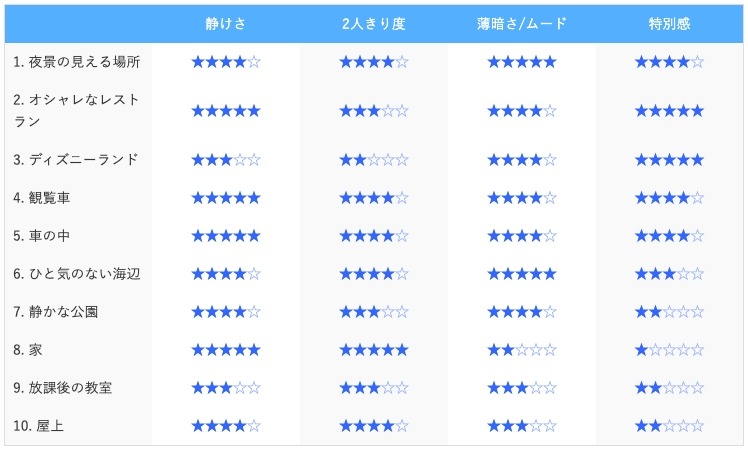
But then they’ll have a line like this in the section about confessing over the phone:
なお、いきなり電話して告白すると相手もびっくりしてしまうので「話したいことがあるから」と、事前に電話していいか確認するようにしましょう。
Note that confessing suddenly over the phone will surprise them, so make sure to check with them beforehand and ask if it’s ok to call them: “There’s something I’d like to talk to you about.”
Everything seems calculated to make the person feel comfortable and special. I haven’t read too deeply, so I’m sure there must be at least a few questionable suggestions on the site (the topic is just too fraught for there not to be), but I’m kind of impressed. The page even includes guidance for elementary school students! Not sure how to feel about that one, but it does seem kind of innocent.
Keep an eye on the February How to Japanese newsletter for more on this topic from a grammar angle!
I regret to inform you that I’ve also started posting on TikTok:
@howtojapanese How to 告白 (kokuhaku) – Dating in Japan #japanesestudy #日本語勉強 #japan #japanese #love #valentinesday #バレンタインデー #恋愛
Radicalization
明けましておめでとうございます! And Happy New Year, as well!
I’m in the Japan Times this week with a look at the 創作漢字コンテスト (Sōsaku kanji kontesuto, Created Kanji Contest): “Radical recombinations: Capture the moment with created kanji.” Tip of the hat to my editor Shaun who alerted me to this fascinating and fun contest. Also, HUGE thanks to the JT production team which turned my scribbles into actual fake kanji:
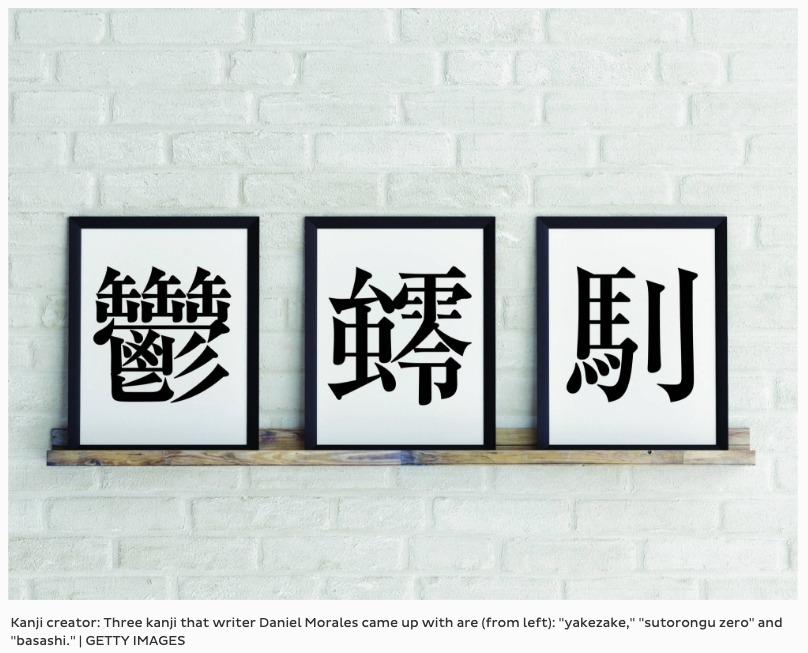
I think there’s a point at which it would be too early to introduce this contest to JSL students—you need to give them time to build up a familiarity with the language before they’d be able to do anything clever with it—but I can imagine it taking up part of a lesson for some teachers out there (nudge nudge, any of you Japanese teachers looking for lesson content) or at the very least an extra credit assignment. Maybe second year of study would make sense? It’s helpful to have students thinking about the role of radicals early on.
I found a couple interesting blog posts on the kanji for Nihonium, which is apparently not exactly a new kanji? I will admit to not fully understanding the connection between 鉨 and 璽 noted in the posts, but the archived original post on Yuwen.jp clearly explains how radicals are involved in the Chinese kanji for elements:
金へん:金属
石へん:常温で固体かつ非金属
气がまえ:常温で気体
さんずい:常温で液体金-hen: metals
石-hen: non-metal solids at room temperature
气-gamae: gas at room temperature
Sanzui: liquid at room temperature
Wikipedia has an excellent rundown on the Japanese names for radicals of different orientations:
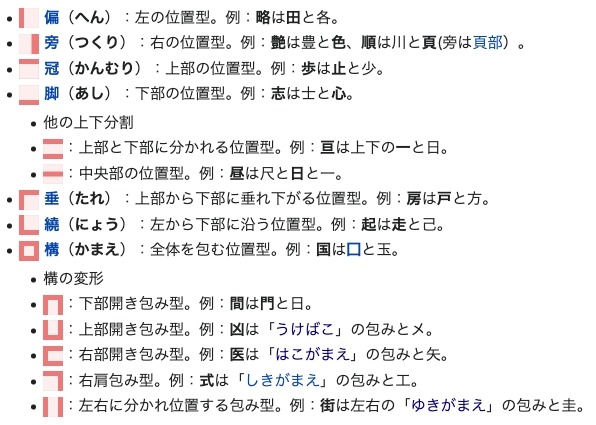
There’s an English explanation here. I don’t think I ever got these names for radical component locations formally in a class! At least not all at once in a list. I’m sure we looked at each radical at some point and talked about them, but I wonder if it would be useful to do a big drop at some point and force students to learn them. Then again, that might fall under the category of too much too soon.
The Wikipedia post doesn’t include the kanji for the radicals, so I’ll give those here:
偏 (hen): left component
旁 (tsukuri): right component
冠(kanmuri): top component
脚 (ashi): bottom component
垂 (tare): component hanging over the top and left
繞 (nyō): component component running from left under the bottom
構 (kamae): component surrounding the character
These are the main component names, but according the Wikipedia post, there are a couple of other positions that don’t seem to have specific names (although each radical itself still has a specific name):
– Top and bottom as in 亘 (Wikipedia gives this radical as 一, but dictionaries say 二?)
– In the middle like 一 in 日
– Open bottom like 間
– Open top like 凶
– Open right side like 医
– Right and left side like 街
Anyone know what’s the deal with these components? Could be that some of these have only one example, like 凵部 (kanbu), which also seems to be referred to as うけばこ (ukebako), and 匚部 (hōbu), which gets called はこがまえ (hakogamae).
How to Strike the Dockside Pose in Japan
I’ve been listening to NHKラジオニュース (NHK Radio News) more regularly as an end-of-year resolution of sorts, and I have two strategies to pass on:
1. Listen to a bunch in a row.
Many of the news updates are just 3-5 minutes long, so you can steamroll through them. Most will include the same top news stories for the day, so you get a ton of repetitions with the same vocabulary. Always a good thing.
If you’re living in Japan or working with Japan, now feels like an especially good time to be tuned into what’s going on.
2. Make sure you don’t miss the hour-long ジャーナル (jānaru, journal) episodes.
These have meatier (meteor?) content. Longer news blasts, more analysis, and some random content sections. Like on December 10 when they discussed 筋肉のつり (Kin’niku no tsuri, muscle spasms) during the ジャーナル医療健康 (jānaru iryō kenkō, Journal Medical Care and Health) section.
I learned a lot about how to express muscle spasms in Japanese. Not only is it a noun as shown above, you can say things like 急に筋肉がつった (kyū ni kin’niku ga tsutta, My muscle suddenly spasmed) or つってしまった筋肉 (tsutte shimatta kin’niku, Muscle that spasmed).
Based on a few Google searches, it seems like the word is most often expressed in hiragana, and not the very cool kanji 攣る (tsuru).
In addition to vocab, you often gain access to different cultural concepts through the show. Including meme-ified bits of the culture.
In this case, the expert who was discussing muscle spasms was explaining how to prevent them, including how to stretch your ふくらはぎ (脹脛, fukurahagi, calves). This involves putting one foot up on something 30-40cm high and then stretching the calf of the other leg. He likened it to a famous pose:
石原裕次郎さんが波止場の船のロープを____くいに片足を乗せて決めるあのポーズのようなイメージですね (Ishihara Yujiro-san ga hatoba no fune no rōpu o ____ kui ni kata-ashi o nosete kimeru ano pōzu no yō na imēji desu ne, It’s like the pose that Ishihara Yujiro struck where he’s ___ing the boat rope on the wharf, with his leg up on the post).
As you can see, there’s one word I couldn’t quite catch—this happens—but I got the gist from context. (It sounded like ひっかくる? Anyone have the answer?)
It’s pretty easy to imagine what this pose looked like, but I was curious so I tried to track it down. This is about the closest I could find:
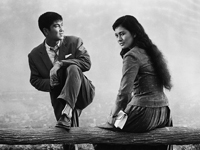
This is a scene from 赤い波止場 (Akai Hatoba, Red Quay) from 1958. (On a side note, Yujiro was also in a movie called 波止場野郎 in 1960. I love this title, and nothing would please me more than to translate it poorly into English, but I will resist this temptation.)
There’s also this “Forever Yujiro” set of Zipang sake which has Yujiro in a similar pose?

Whatever the origin of the pose, Yujiro, who is basically Japanese Elvis (full credit to the graduate assistant who made this comparison when I was an undergrad), has effectively made this the pose to strike when you find yourself dockside. Do a quick Google Images search for 波止場 ポーズ. Kind of amazing, no?
We also have confirmation from Chiebukuro where a guy asks “What are those things on docks called? You know, those little fuckers that Yujiro puts his foot up on?”
This is clearly a cultural phenomenon.
At any rate, I now have a new goal in life – to stand on a dock in Japan striking this pose. Montrose Harbor in Chicago may have to do for now.
Takeaways from “Who We’re Reading When We’re Reading Murakami”
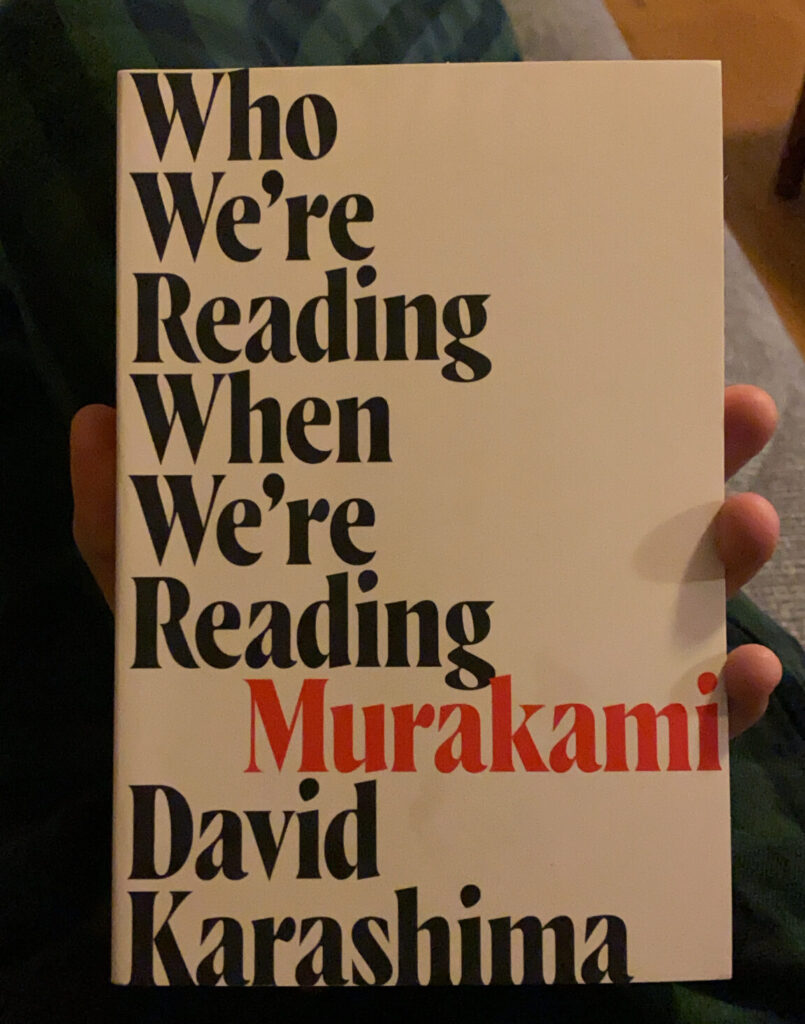
I resisted the call to read David Karashima’s Who We’re Reading When We’re Reading Murakami for too long.
I read a few of the excerpts online, which were interesting, and I laughed at quotes that I saw on Twitter (one from David Mitchell, which I include below), but I think I finally bit the bullet when I realized that the Chicago Public Library had a copy. Once I started reading, I knew I needed to own a personal copy just a few pages in: It’s an incredible book.
Karashima mines personal correspondence from Murakami, Alfred Birnbaum, Elmer Luke, Jay Rubin, and tons of folks on the publishing side. He’s looking at faxes, emails, and edited manuscripts. He speaks with Junot Diaz, David Mitchell, and Tess Gallagher amongst other famous writers. My only complaint about the book is that it ends with the publication of The Wind-Up Bird Chronicle. There’s so much more to look at. But I’m sure that the publisher had him on a tight word count.
Here’s a running list of takeaways I kept while I was reading the book. I’m not sure if these qualify as “spoilers,” but if you haven’t read the book yet, you may want to do that before reading these:
– Birnbaum translated Pinball, 1973 before Hear the Wind Sing. He also had no formal translation training. Karashima makes it sound like he just submitted the manuscript and then the bunkobon KI version of the translation showed up in the mail later on! This seems like the way Murakami submitted his only copy of the Hear the Wind Sing manuscript.
– Norwegian Wood was published in September 1987 and sold 800,000 copies by January 1988. By the end of that year it was 3.55 million. Those are crazy numbers.
– Elmer Luke fasted twice to avoid the draft. There has obviously been a lot of “bone spurs” talk in recent years, which I think has done a disservice to conscientious objectors during the Vietnamese War: the passages in the book—Elmer Luke riding with a bus full of others who all had excuses to get out of the draft—really emphasized to me how unjust it was, as a war, as a strategy to man a war, and especially for those who weren’t able to avoid it and ended up dying in Asia. What art have we lost or nearly lost because of war?
– Shigeo Okamoto, the designer who did the cover for 回転木馬のデッド・ヒート (Dead Heat on a Merry-go-round), designed the cover for the English translation of A Wild Sheep Chase. 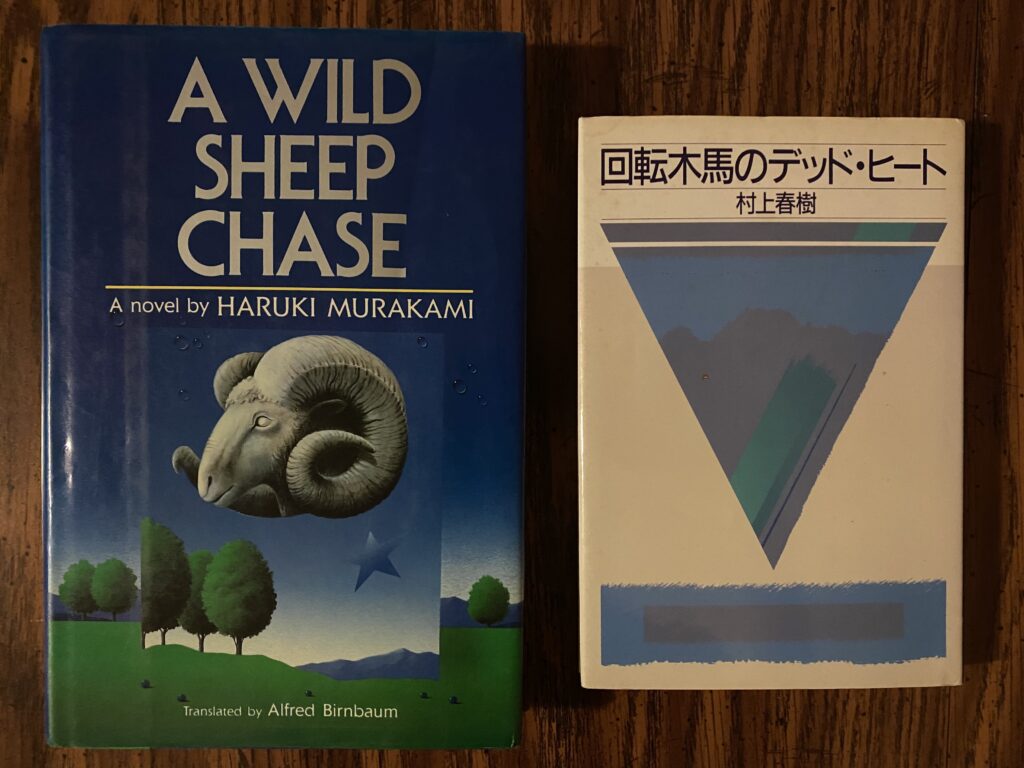 This is pretty wild to me because they’re so totally different. The former is so abstract while Sheep is more surreal. I actually own a copy of both. A friend got me A Wild Sheep Chase years ago, and the Dead Heat first edition was one of the first purchases I made when I moved to Japan…I imagine it was significantly less expensive. You can see more of Okamoto’s work here.
This is pretty wild to me because they’re so totally different. The former is so abstract while Sheep is more surreal. I actually own a copy of both. A friend got me A Wild Sheep Chase years ago, and the Dead Heat first edition was one of the first purchases I made when I moved to Japan…I imagine it was significantly less expensive. You can see more of Okamoto’s work here.
– A Wild Sheep Chase was a Book-of-the-Month Club pick. Jay Rubin mentions the $50,000 advertising budget in his book Haruki Murakami and the Music of Words (Karashima notes $46,000), but the book club was new information for me and seems like a pretty big deal.
– Murakami writes about an early trip to New York at the end of 遠い太鼓 (Distant Drums) apparently. Karashima includes a note about this, so now I’m looking forward to getting through the rest of that book.
– The details about how “The Windup Bird and Tuesday’s Women” was edited for The New Yorker are fascinating (major revisions that border on censorship). Also very, very interesting is Karashima’s suggestion that Murakami decided to expand it into a novel because it had been translated and was well received upon publication in 1986. Murakami expanded into a novel when he took up his position as writer-in-residence at Princeton in 1991.
– It becomes more and more apparent that Elmer Luke has earned his acknowledgment inside the cover of Hard-boiled Wonderland and the End of the World. He doesn’t get top billing, but there is the line “The translator wishes to acknowledge the assistance of editor Elmer Luke.” His name was familiar from Jay Rubin’s book, but Karashima does an exceptional job of bringing him to life through his back story as well as quotes like this, where he explains why he edited Hard-boiled Wonderland the way he did:
“I think the larger concern for me was that there was (in my humble opinion) chaff that was cluttering the picture—stuff that was repetitious or tangential or less than critical to the narrative or worked against it—the chaff needed to be culled, so that what we had was germane or, if not, appealingly whimsical or amusing or deep. … There was also the awareness that Japanese editors did not, do not, edit much. For whatever reason. In translation that lack becomes clear. So—my hubris, perhaps—I felt I had to do what had not been done.” (113)
Oh, if only someone had done that to his more recent novels. It’s clear that The New Yorker is still editing Murakami somewhat heavily (all you have to do is compare the Japanese version of the piece about his father with the English), but his novels no longer get this treatment in translation.
– Several of the sexy parts from Hard-boiled Wonderland with the Girl in Pink are provided courtesy of literature professor Hosea Hirata.
– Birnbaum is quoted saying they “must have ended up cutting around a hundred pages” (112), but it’s not nearly this much. It must have felt that way because he and Luke would work on the book five to six hours a day! Luke adds that when “the true Murakami believers” find out about the edits they “will be horrified. But that’s okay too. I made the choice. Or we did.”
I wouldn’t say I was horrified (if you didn’t know I was a Murakami true believer by now, surprise!). I did a five-blog post series on some of these cuts from Chapter 21 when the pair are running around underground (1, 2, 3, 4, 5). I think that some of the sections needed to go (especially the bicycle song she sings), but others could have been kept. There’s a scene where they make out in the dark that’s compelling, and one at the end of the chapter where Watashi reflects on life that are probably worth keeping. Hell, even the scene where he shows her his erection in Chapter 31 could probably stay. But the translation does stand on its own, so I’m not too torn up.
– There’s no mention of the edits that Murakami made to the Complete Works edition of Hard-boiled Wonderland. I’m so curious to know more about how the changes came to be made, and WHEN they were made.
– Jay Rubin finished his book The Sun Gods in 1989. The book was published by Chin Music Press in 2015, and I don’t think I realized he’d written it much earlier. I am halfway through this book. I’ve been reading off and on for a few years, which I don’t mean as commentary—sadly, I have a lot of books in this state of limbo.
– Karashima has a fantastic callback to Murakami’s fiction when he tells the story of Jay Rubin encountering Murakami. Rubin got a call from an editor at Vintage, asking him to read Hard-boiled Wonderland and evaluate its potential for translation. Rubin no longer remembers this person’s name, so it’s almost like he received a phone call from a stranger…much like a Murakami narrator.
– This is an incredible quote from Murakami about being edited for The New Yorker:
“What can I say—The New Yorker has a large number of readers and they also pay really well,” he tells me, laughing. He says that if the editor of a Japanese magazine had made similar suggestions, “of course I would change things that I agree with, but in principle I would say no. Not just with The New Yorker, but in foreign markets in general, I think you have no choice but to go along with their rules. There are people who criticize me for this, saying, ‘I bet you let them do what they want because it’s The New Yorker.’ Yes, that’s exactly right! But like I said, I reverse the changes when the story is published in book form.”
This is just an incredible, mind-blowing view on the role of editing in writing. It’s almost like he doesn’t see the point of it. I can imagine that he might be skeptical of it, having been edited so heavily earlier in his career only to receive a lighter touch once he made it big. It must feel like those initial edits were all made mistakenly. But as mentioned previously, The New Yorker is still editing him. Even his nonfiction.
– I’m amazed by how many faxes Murakami and Luke (and everyone else!) were sending to each other. I think that’s something that my generation missed. My first memories of fax machines are the daily spam marketing advertisements we would receive at the first part time job I ever had. Email killed off the practicality of the fax (but not the security) pretty quickly. I imagine there was a period in the 80s and 90s after email started being used more widely when fax still made the most sense as a communication channel.
– There are several mentions of very early publications of Murakami translations, notably Philip Gabriel’s translation of “Kangaroo Communique” published in ZZYZYVA and (new to me) “On Meeting My 100% Woman One Final April Morning” by Kevin Flanagan/Tamotsu Omi. I’ve always wonder how Gabriel worked out the translation rights to publish this one. It isn’t mentioned here.
– Murakami says he doesn’t like “The Last Lawn of the Afternoon.” That story has such a mood. I haven’t read it for a while but remember enjoying it.
– Karashima does a nice job of emphasizing how Murakami arranged translation of The Wind-Up Bird Chronicle before it was published in Japanese. This reduced the publication time between his translations to the three years from Dance Dance Dance (1994) to WUBC (1997).
– Fascinating: “Murakami also tells me that he is particularly keen on seeing new versions of the works originally translated by Birnbaum for the American market.” (213)
– Even more fascinating! “The unabridged translation [of The Wind-Up Bird Chronicle] donated by Rubin to the Lilly Library [at Indiana University] will be made accessible in 2026.” (227) The book doesn’t seem to specify how this will happen, and Knopf seems hesitant but open to the idea, based on a few quotes in the book.
– The book takes the publication of The Wind-Up Bird Chronicle as its endpoint, so the criticism of the book gets quoted somewhat liberally, and I find myself impressed with Michiko Kakutani’s thoughts at the time of publication: “‘Wind-Up Bird often seems so messy that its refusal of closure feels less like an artistic choice than simple laziness, a reluctance on the part of the author to run his manuscript through the typewriter (or computer) one last time.” Karashima follows this quote with other critics who seem to admit that WUBC is messy but say that it doesn’t matter. I’ve made it clear that I think WUBC only looks worse as Murakami continues to put out long novels that are poorly edited.
I’m noticing from those links that I predicted a short Murakami book in 2021 or a long book in 2024/2025. He put out a collection of short stories this year, so maybe that tides us over for a 2022/2023 publication of a longer novel. Will be interesting to see, and to see if it sheds any light on the rest of his works.
– One of the quotes that convinced me to read this book was David Mitchell’s quote: “[A Wild Sheep Chase’s] characters were existentially untethered. They lived in bars, coffee shops and tiny rooms with no view to speak of. They worked, had odd conversations, drank beer, slept, and worked. Family rarely entered the picture. They made no plans for their futures. Not unlike English teachers in Japan, now that I think of it.” (235)
– Philip Gabriel and Ted Goosen get short thrift! I imagine this is mostly due to a page/word limit, but I found myself super curious about their backgrounds. I think Mr. Karashima owes us a sequel, or at the very least a lengthy piece in The New Yorker or The Atlantic.
– HUGE REVEAL IN THE ACKNOWLEDGMENTS: Murakami has asked Jay Rubin to do a new translation of Hard-boiled Wonderland and the End of the World! This is really exciting. I can’t wait to see how it ends up.
How to Japanese Newsletter

Happy 💩tober!
As the world slowly, incessantly falls apart, I’ve been trying to expand my writing opportunities and started a monthly How to Japanese newsletter. I won’t be posting it here each month, but I did want to give it a plug in the main feed in case anyone is interested in subscribing. It will generally include a short piece about Japan/Japanese and something about beer/brewing followed by links/plugs.
I started in September with a look at an inspirational phrase from Higashimura Akiko’s manga alongside an ode to the local homebrew shop. October will have a more actionable piece of language for your business needs and a specific yeast recommendation.
Hope you subscribe and share!
